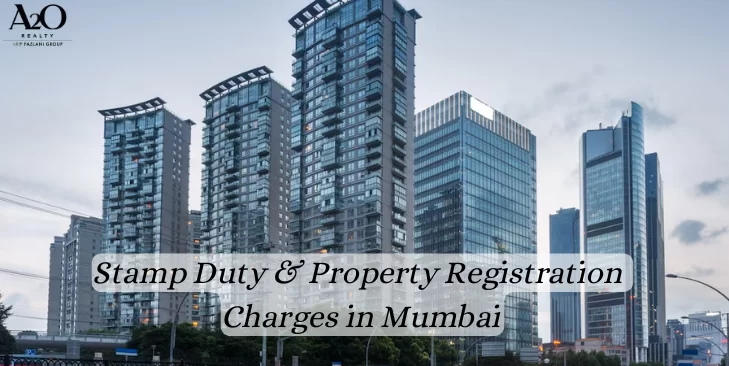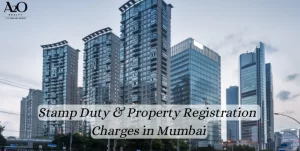This blog offers a comprehensive guide to understanding and managing the stamp duty and property registration process in Mumbai.
Buying a property in Mumbai is a significant investment, and understanding the associated costs is crucial. What one should not forget is that in addition to the price of the property, one has to consider stamp duty and registration charges. These charges are crucial in the real estate market, but they create ambiguity to the consumers. This guide gives an insight of stamp duty and property registration charges in Mumbai, its significance, computation and procedure of payment.
What are Stamp Duty and Registration Charges?
Stamp duty is the fee the government charges for legal papers, including those documents that concern property sales. As the evidence of the transaction’s legal nature and the official transfer of ownership, it plays a crucial role. The amount of stamp duty that is paid is normally a percentage of the current market value of the property for sale. Still this tax is very important to the government and is applied to different services and to construction of infrastructures.
Stamps duty is the payment made to the government for the formal transfer of the property transaction. This process also makes a way of proving that the new owner’s name is legally registered in the property records. The records give legal backing as well as rights of ownership. Stamp duty and registration charges are two different things, although both are calculated as a percentage of the property’s market value, with registration charges usually being a fixed percentage of the stamp duty.
Differences Between Stamp Duty and Registration Charges
| ASPECT | STAMP DUTY | REGISTRATION CHARGES |
| Definition | A tax on property transactions. | Fees for recording the property transaction. |
| Purpose | Legal evidence of the transaction and government revenue. | Legal documentation of ownership transfer. |
| Calculation | Percentage of the property’s market value. | Typically, a fixed percentage of the property’s value. |
| Usage | Funds public services and infrastructure. | Ensures legal protection and recognition of ownership. |
| Applicable On | Sale, purchase, and transfer of property. | Registration of the property transaction. |
| Variations | Varies by property type and location. | Generally uniform, but may have a cap. |
| Concessions | Available for specific groups (e.g., women buyers). | Less common and more uniform. |
Stamp Duty Rates in Mumbai
Stamp duty charges are an important factor that one needs to consider in relation to a property purchase in Mumbai. The current stamp duty rate for the property within the Mumbai Municipal Corporation area is 5% of the market value of the property. This rate applies to the residential and the commercial properties as well. However, some exemptions are allowed to foster some classes of people to invest in the real estate. For instance, the women buyers enjoy a one percent rebate, meaning that their stamp duty is set at four percent.
As for the difference in rates, it also depends on the location of the property in question. Stamp duty in the suburban and rural areas of Mumbai is slightly lesser at approximately 3 percent. This variance is aimed at increasing property exchanges between various areas. Stamp duty rates have been observed to have trends and changes recently. The government sometimes lowers stamp duty costs to help boost the real estate market when the economy changes.
Understanding the current stamp duty charges in Mumbai is essential for property buyers to budget and plan their purchases accurately. The government sometimes lowers stamp duty costs to help boost the real estate market when the economy changes.
Factors Affecting Stamp Duty Charges in Mumbai
- Property Location (Urban vs. Rural Areas) The location of the property significantly affects the stamp duty rates. Properties in Mumbai’s urban areas generally have higher rates than those in rural areas.
- Property Type (Residential, Commercial, Industrial) The type of property also influences the stamp duty charges. Residential properties typically have lower rates than commercial or industrial properties.
- Property Value The property’s market value is crucial in determining stamp duty. Higher-valued properties attract higher stamp duty charges.
- Ownership Type (Individual, Joint, Corporate) The ownership type can also affect the stamp duty rates. For example, properties registered under a woman’s name might receive a concession, and joint ownership might attract rates different from individual ownership.
Property Registration Charges in Mumbai
The stamp duty in Mumbai is 1% of the market value of the property and registration charges are also 1% of the market value of the property. This rate is applicable for all types of properties; residential, commercial, and industrial properties. For example, if the current market value of the property is ₹ 10,00,000 then the property registration charges in Mumbai would be ₹ 10,000. This fixed rate applies to all properties and thus, it is easy for the buyers to estimate their registration fees.
Apart from the above-mentioned primary charges for property registration in Mumbai, there are other expenses as well. This includes the cost of preparing and checking the documents, fees for registration, other charges inclusive of notarization charges and delivery charges among others. These additional costs add to the cost of property registration in Mumbai, and this is the reason why.
How to Calculate Stamp Duty and Registration Charges
Calculating stamp duty and registration charges is crucial for budgeting your property purchase. Here is the step-by-step guide to calculating stamp duty:
- Determine the market value of the property.
- Apply the applicable stamp duty rate based on the property’s location and type.
- Calculate the stamp duty by multiplying the market value by the stamp duty rate.
Example of Calculation for Different Property Values
For instance, for a residential property valued at ₹1 crore in an urban area:
- Stamp duty = ₹1 crore x 5% = ₹5 lakhs
For a commercial property valued at ₹2 crores in a suburban area:
- Stamp duty = ₹2 crores x 3% = ₹6 lakhs
These calculations are simple but can vary based on location and property type. Use online calculators on government or real estate websites to quickly find the exact amount. Also, talking to a legal or real estate expert can give you accurate calculations and consider any special discounts or extra charges.
Procedure for Paying Stamp Duty and Registration Charges
- Calculate the total amount of stamp duty and registration charges.
- Prepare the necessary documents, including the sale deed and property details.
- Visit the official government website or designated banks for payment.
- Submit the documents and payment receipt for registration.
Online vs. Offline Payment Methods
Payments can be made both online and offline. Online payments are more convenient and can be done through the official government portal, while offline payments can be made at designated banks.
Required Documents and Their Submission Process
During registration, make sure to submit all necessary documents, such as the sale deed, ID proof, and payment receipts. These documents are essential for the legal transfer of property ownership.
Important Points to Consider
- Ensure the stamp paper is issued within 6 months of the transaction date.
- Stamp all documents requiring stamp duty before registration, ideally on the same or the next working day.
- The stamp paper must be issued in the names of all parties involved in the transaction.
- Once an adhesive stamp is used, it cannot be reused or removed for another document.
Adhering to these rules will ensure the payment of stamp duty and registration fees goes smoothly and within regulations.
Knowledge of stamp duty and property registration process is very important for any buyer, especially in Mumbai. Real estate buyers can make their property purchases efficient and legal by understanding the fees, how they are determined and how they can be paid. It is imperative that one keeps abreast with the current rates and policies. A2O Realty offers useful advice and experience to clients to help them with the stamp duty and registration aspect. For everyone who wants additional information or assistance, one can always consult with professionals real estate developers, such as A2O Realty, who can make the process of buying and selling property easier and free from issues.







